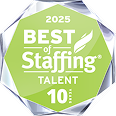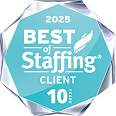Choosing which employee benefits fit your company is an important decision for all C-level executives and HR staffers. Healthy, loyal, engaged employees bring both large and small companies success. How can your company create healthy, loyal, engaged employees? By offering benefits that satisfy their needs and wants.
Employee turnover can cost a company hundreds of thousands of dollars, and benefits play a significant role in determining company turnover rates. As Patriot Software’s 2019 study of over 700 industry experts suggests, offering nontraditional benefits on top of standard benefits is one of the key components to talent retention.
Catering to your employees’ desires and priorities determines how successful you are at employee engagement and retention. More than ever, crafting the right benefits and perks package is imperative for company success.
Employees’ Most Desired Benefits
According to the Association of International Certified Public Accountants (AICPA), which surveyed 2,026 adults in the US about which benefits they most valued, employees heavily value health insurance, a 401(k) match, and paid time off.
| Total Workforce | Millennials | Gen X | Baby Boomers | |
|---|---|---|---|---|
| Health Insurance | 56% | 47% | 63% | 67% |
| 401(k) Match | 56% | 48% | 54% | 71% |
| Paid Time Off | 33% | 37% | 33% | 24% |
| Flexible Work Hours | 21% | 26% | 15% | 15% |
| Working Remotely | 15% | 17% | 16% | 12% |
| Student Loan Forgiveness | 15% | 19% | 13% | 6% |
| Additional Skills Training | 14% | 19% | 13% | 6% |
| Tuition Reimbusement | 11% | 12% | 14% | 6% |
As the chart shows, Millennials, the largest generation in the workforce, care more about PTO and flexible work hours than older generations. Trends such as this are essential to note because attracting talent often comes down to which non-traditional benefits companies offer, rather than standard benefits. For example, a 2016 ICIMS study showed that 92% of full-time employees believed non-traditional benefits such as dental/vision insurance and PTO were leading decision factors for top-tier talent.
That doesn’t mean you should put all of your funds into nontraditional benefits. Standard benefits are the most important across all generations. But because they are common, how well you supplement them with nontraditional benefits can influence top talent’s decisions.
What Benefits Do Employees Care About?
Retirement has always been important to employees, but since companies have moved away from pensions, it has become even more desired. Another reason for employees wanting retirement packages is increased life expectancy. People are living longer than ever, and consequently, less prepared for a longer retirement.
Longer life spans also affect the demand for health insurance plans. With longer lifespans comes increased healthcare costs, and employees need their employers to help with those costs. Added to increased costs is the increased complexity of the American healthcare system. Health insurance isn’t a one-size-fits-all deal. As Humphrey Taylor and Ian Morrison point out:
“United States insurance coverage, for those who have it, may be provided by Medicare Parts A, B, C, and D, 50 different state Medicaid programs (or MediCal in California), Medicare Advantage, Medigap plans, the Children’s Health Insurance Plan, the Women, Infants and Children Program, the Veterans Administration, the Federal Employees Health Benefits Program, the military, the hundreds of thousands of employer-provided plans and their insurance companies, or by the individual insurance market. This insurance may be paid for by the federal or state governments, employers, labor unions, or individuals. Some employers’ plans cover retirees; others do not. The result is that the system is pluralistic, mysterious, capricious, and impossible for most patients and providers to understand.”
The quote shows how bureaucratic and confusing health insurance can be. Often, employees don’t know where to turn for guidance. Having an employer who can simplify the process is a key perk.
Health Insurance
Health insurance is a broad category that includes traditional healthcare, dental insurance, and vision insurance. It’s no surprise that companies and candidates place such a high premium on it.
From the candidate’s perspective, a comprehensive health insurance program is more valuable than a moderate increase in salary. What good is a salary increase if you have to spend it on medical bills?
From your perspective as an employer, it’s in your best interest to keep your employees healthy. Healthy employees are more productive day-to-day and also less likely to miss time due to health issues.
Health insurance doesn’t only matter to baby boomers, members of Generation X, and Generation Y members. Millennials and Generation Z workers tend to be healthier and have lower premiums. However, health insurance can still cost them hundreds of dollars per month if they buy insurance on the open market.
Health insurance is an expensive benefit, but creative solutions can help reduce costs while improving your employees’ overall wellness. At Culver Services, we help companies to craft a Proactive Health Management Plan (PHMP). This preventative healthcare solution incentivizes employees to perform a small health-related task each month, like reading an article about fitness or having a phone call with a nurse. These incentives encourage employees to take more care of their health, reducing premiums and medical costs down the line. PHMP leads to an average 11-17% decrease in overall healthcare spend after two years in the program.
Because the program takes advantage of the tax code, it’s free to employers and gives employees more money each payday. If you want to offer insurance but are concerned about the bottom line, then a proactive health management plan can reduce your costs while improving outcomes.
Life Insurance
Most of the reason that we work is for financial security. Uncertain income gaps and compiling bills can lead to mental and physical health problems such as chronic stress or depression. If you have a family, that stress compounds. In case of an emergency, it helps to know that your family will be financially safe.
Since life insurance is not a standard benefit, candidates may actively seek companies who provide life insurance options.
Vision Insurance
Under the Affordable Care Act, employers don’t have to include vision insurance. But it is a great way to move ahead of your competition and improve employee retention. With blue light from computers hurting employees’ eyes, vision insurance is more sought after by candidates than ever. Vision insurance can help prevent age-related macular degeneration (AMD) and cataracts.
Long Term Disability Insurance
Julie Stich, associate vice president of content at the International Foundation of Employee Benefits Plans (IFEBP) says, “Disability benefits aren’t on most employees’ radars. But the reality is, one in four employees will need disability in their career.”
The average long-term disability absence is 34.6 months. That means, without long-term disability insurance, an employee would miss almost three full years of salary. That’s incredibly challenging if the employee is single, let alone if they have a family to support.
Offering long-term disability insurance shows employees that you’re prepared to stand behind them in a worst-case scenario. You know how unexpected obstacles arise in business and life, and you have systems in place to help them overcome those obstacles.
Retirement and Deferred Compensation Plans
Retirement plans and health insurance are generally the most crucial benefits for your company to offer. The reason for this is that they provide your employees with the most security in their position. If you can give an employee a deferred compensation plan or pension, you instantly put yourself in an elite class of employers.
Deferred compensation plans help companies’ retention rates and reduce turnover. If employees know they have benefits to look forward to in the future, they will likely remain loyal to the provider of those benefits.
Employees prefer working for companies that provide them with a retirement plan rather than having to plan it themselves.
PTO (Paid Time Off)
Gone are the days when candidates were happy to accept limited vacation days. With increased globalization and increased access to international travel, younger candidates find paid vacation benefits to be one of the most critical aspects of an employer’s benefits package.
Couples also find paid parental leave to be an essential job perk. Because many households need both parents to provide for a family, Americans need more time at home for newborns. Daycare centers are also a smart perk for employers to consider.
Again, the average candidate desires a company that cares about their family’s well-being. When you put resources in place for candidates’ families, you place yourself a notch above your competition.
Employers’ Most Desired Benefits
The 2018 AICPA study also surveyed employers to see which benefits they thought were most significant to offer their employees.
- Health Insurance: 95%
- Leave benefits: 50%
- Flexible working benefits: 29%
- Professional development benefits: 17%
- Wellness benefits: 11%
- Financial benefits: 6%
- Family-friendly benefits: 3%
The percentages show that employers had roughly the same order of benefits as employees. But why are these benefits the most important to employers and employees alike?
One answer is that employers have a strong incentive to care about what their employees care about. If you as an employer prioritize different benefits from what your employees want and need, you’re at risk of losing top talent.
Become the Most Sought After by Taking Care of Your Employees
Providing benefits and perks is a core component of keeping workers happy in their jobs. A high salary is important to candidates, but what good is a high salary if they can’t enjoy the money they make? Benefits like health insurance give employees more take-home pay, and paid time off offers employees more chances to enjoy their lives.
Loyalty is a two-way street, and when companies offer candidates the most desirable benefits, they immediately build trust. If you’d like to build an employee benefits package that helps engage and retain top talent, we can help.





